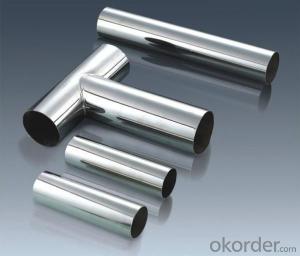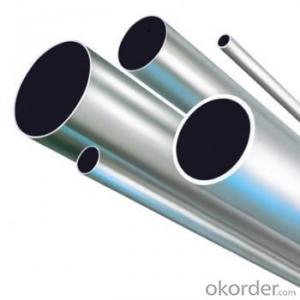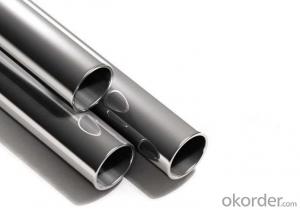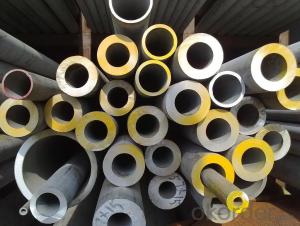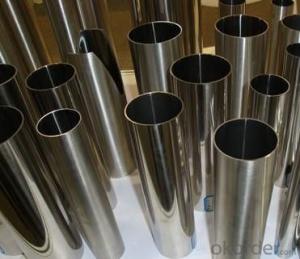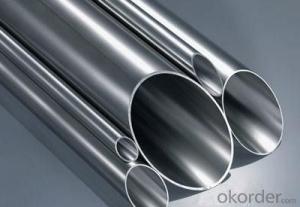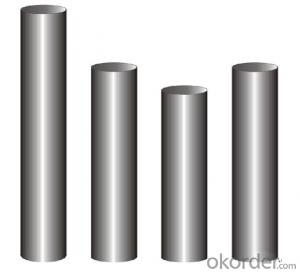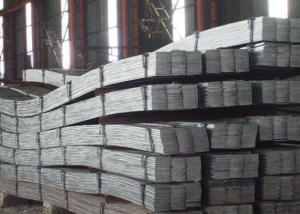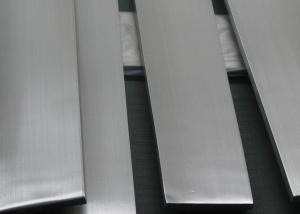304 Stainless Steel Pipe
- Loading Port:
- China main port
- Payment Terms:
- TT OR LC
- Min Order Qty:
- 5 m.t.
- Supply Capability:
- 100000 m.t./month
OKorder Service Pledge
OKorder Financial Service
You Might Also Like

304 stainless steel pipe price list
Our Advantages
You can get a competitive price with high quality.
We can provide sample for your evaluation.
We can provide Mill test certificate.
Your enquiry will get quickist and efficient response.
Introduction of grade 304
304 stainless steel material is a kind of common stainless steel materials, corrosion prevention is better than 200 series stainless steel materials. High resistance to high temperature is also better, it can reach to 1000-1200 degrees. 304 stainless steel has good corrosion,corrosion resistance and good resistance to intergranular corrosion. For oxidizing acid, obtained in the experiment, the concentration of 65% or less under the boiling temperature of nitric acid, 304 stainless steel has a strong corrosion resistance. To most organic and inorganic acid and alkali solution with good corrosion resistance ability.
Physical properties
Tensile strength σb (MPa): 520
Conditions yield strength 0.2 sigma (MPa) :205
Elongation δ5 (%) :40
Section shrinkage ψ (%): 60
Hardness: ≤187HB ≤90HRB≤200HV
Some details of our products
| Product: | 304 stainless steel pipe price list |
| Grade: | 304; sus304; 1.4301; |
| Standard: | ASTM,AISI,JIS,EN,DIN,GB |
| Surface treatment: | 8k, ba, hl |
| Thickness: | 0.4-30mm |
| Outer Diameter | 20-400mm |
| Productivity: | 900MT/Month |
| Products range | hot rolled stainless steel sheet, hot rolled stainless steel coil, hot rolled flat steel,cold rolled stainless steel sheet, cold rolled stainless steel coil, Industrial tube, decorative tube |
Trade terms
| Product | 304 stainless steel pipe price list |
| MOQ: | 5 Ton |
| Payment Term: | 1. 30%T/T in advance ,the balance against the B/L copy 2. 30%T/T in advance ,the balance against the L/C at sight 3. 100%L/C at sight |
| Price Term: | FOB/CFR/CIF |
| Delivery: | 1.10 days after receiving the deposit of T/T 2.10 days after receiving the L/C original |
| Packaging: | Standard Export Packing |
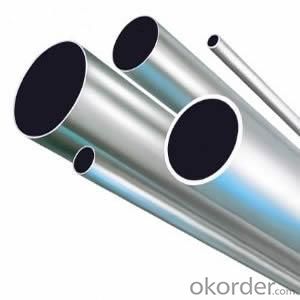
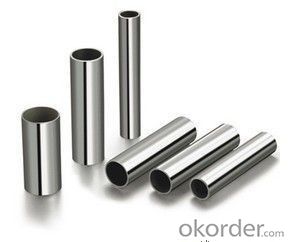
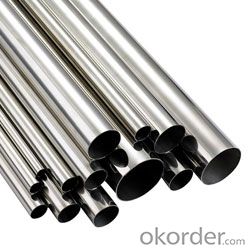
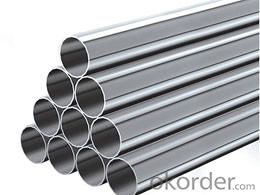
- Q:Can stainless steel pipes be used in the food and beverage industry?
- Certainly, the food and beverage industry can utilize stainless steel pipes. Stainless steel is highly favored for piping in this sector because of its impressive resistance to corrosion, hygienic attributes, and long-lasting nature. By employing stainless steel pipes, there is no risk of any chemical reactions occurring between the pipes and the food or beverages, effectively preserving the products' integrity and safety during transportation. Furthermore, the ease of cleaning and maintenance of stainless steel pipes is of utmost importance in the food and beverage processing industry, where maintaining a high standard of sanitation is crucial. In summary, stainless steel pipes are extensively embraced and employed in the food and beverage industry due to their dependability and suitability for handling a diverse range of products.
- Q:Can stainless steel pipes be used for agricultural irrigation systems?
- Indeed, agricultural irrigation systems can utilize stainless steel pipes. With its exceptional durability and resistance to corrosion, stainless steel proves to be an appropriate material for a wide range of purposes, including agricultural irrigation. Its remarkable ability to withstand rust and corrosion, even when faced with moisture, chemicals, and fertilizers commonly employed in irrigation systems, is well-known. Furthermore, stainless steel pipes possess the capability to endure high-pressure water flow, enabling them to efficiently deliver water to crops. Notably, stainless steel is environmentally conscious, being entirely recyclable, which renders it a sustainable option for agricultural irrigation systems.
- Q:Can stainless steel pipes be used for drinking water applications?
- Yes, stainless steel pipes can be used for drinking water applications. Stainless steel is a corrosion-resistant material that does not leach harmful chemicals into the water, making it a safe and reliable option for transporting drinking water.
- Q:What is the difference between 2205 and 2507 stainless steel pipes?
- The main difference between 2205 and 2507 stainless steel pipes lies in their chemical composition and corrosion resistance. While both are duplex stainless steels, 2205 contains 22% chromium, 5% nickel, and 3% molybdenum, whereas 2507 contains 25% chromium, 7% nickel, and 4% molybdenum. This difference in composition provides 2507 with slightly higher corrosion resistance, especially in environments with high levels of chloride ions. Additionally, 2507 stainless steel pipes offer better strength and impact toughness compared to 2205. Consequently, 2507 is often chosen for applications that require enhanced resistance to corrosion and higher strength.
- Q:Can stainless steel pipes be used for automotive exhaust systems?
- Automotive exhaust systems can indeed utilize stainless steel pipes. Stainless steel is widely favored for exhaust systems due to its exceptional resistance to corrosion, high strength at elevated temperatures, and impressive durability. It is capable of enduring the extreme heat and harsh conditions frequently encountered in automotive exhaust systems, rendering it a dependable and long-lasting choice. In addition, stainless steel pipes boast a smooth surface, aiding in friction reduction and enhancing exhaust flow, ultimately leading to improved performance and fuel efficiency. Moreover, stainless steel is a lightweight material, contributing to decreased vehicle weight and enhanced handling. All in all, stainless steel pipes are a suitable and frequently employed material for automotive exhaust systems.
- Q:What are the different types of stainless steel pipe end connections?
- There are several different types of stainless steel pipe end connections, each designed for specific applications and requirements. Some of the most common types include: 1. Threaded connections: This type of connection features threads on the inside or outside of the pipe end, allowing it to be screwed onto another threaded fitting or pipe. Threaded connections are typically used for low-pressure applications. 2. Socket-weld connections: In this type of connection, the pipe end is inserted into a socket or recess of a socket-weld fitting and then welded around the outside of the pipe. Socket-weld connections are suitable for high-pressure applications and are known for their strength and reliability. 3. Butt-weld connections: Butt-weld connections involve welding the pipe end directly to another pipe or fitting. They are commonly used in high-pressure and high-temperature applications. 4. Flanged connections: Flanged connections feature a flange on the pipe end, which is then bolted to a mating flange on another pipe or fitting. Flanged connections are used in applications requiring easy disassembly or where there is a need for frequent maintenance. 5. Compression connections: Compression connections involve using a compression fitting to join the pipe ends. These connections are commonly used in plumbing and gas supply systems and are known for their ease of installation. 6. Grooved connections: Grooved connections involve using grooved couplings to join the pipe ends. These connections are often used in fire protection systems and are known for their quick and simple installation. Overall, the choice of stainless steel pipe end connection depends on the specific application, pressure requirements, ease of installation, and maintenance considerations. It is important to consult with a professional or refer to industry standards to determine the most suitable connection type for your particular needs.
- Q:What is the difference between seamless and high-frequency welded stainless steel pipes?
- The main difference between seamless and high-frequency welded stainless steel pipes lies in their manufacturing process. Seamless pipes are made by piercing a solid cylindrical billet of stainless steel and then rolling it into a pipe shape. This process ensures a smooth and continuous surface, resulting in a pipe with no welded seams. On the other hand, high-frequency welded pipes are created by using a high-frequency electrical current to melt the edges of stainless steel strips and then welding them together. The welded seams in high-frequency welded pipes may be visible and can affect the overall smoothness of the pipe's surface.
- Q:What is the maximum pressure rating for stainless steel pipes?
- The maximum pressure rating of stainless steel pipes can vary due to several factors, including the stainless steel grade, pipe diameter and wall thickness, and specific application or industry requirements. Nonetheless, stainless steel pipes are renowned for their exceptional strength and resistance to corrosion, making them ideal for high-pressure applications. Generally, stainless steel pipes can withstand maximum pressure ratings ranging from a few hundred psi to several thousand psi. To determine the precise maximum pressure rating for a specific stainless steel pipe in a given application, it is imperative to refer to the relevant industry standards, codes, and specifications or seek guidance from a qualified engineer or manufacturer.
- Q:What is stainless steel pipe made of?
- Stainless steel pipe is primarily made of an alloy consisting of iron, chromium, and other elements such as nickel and manganese. The exact composition of stainless steel pipes may vary depending on the grade or type of stainless steel being used. Generally, stainless steel pipes have a high chromium content (at least 10.5%) which provides excellent corrosion resistance and durability. The addition of other elements helps to enhance various properties of the stainless steel pipe, such as strength, heat resistance, and weldability. Overall, stainless steel pipes are made of a strong and versatile material that is resistant to corrosion, making them suitable for a wide range of applications in industries such as construction, automotive, and manufacturing.
- Q:Can stainless steel pipes be used for pharmaceutical processing equipment?
- Yes, stainless steel pipes can be used for pharmaceutical processing equipment. Stainless steel is highly resistant to corrosion, easy to clean, and has excellent hygiene properties, making it a suitable material for pharmaceutical applications where cleanliness and sterility are crucial.
1. Manufacturer Overview |
|
|---|---|
| Location | |
| Year Established | |
| Annual Output Value | |
| Main Markets | |
| Company Certifications | |
2. Manufacturer Certificates |
|
|---|---|
| a) Certification Name | |
| Range | |
| Reference | |
| Validity Period | |
3. Manufacturer Capability |
|
|---|---|
| a)Trade Capacity | |
| Nearest Port | |
| Export Percentage | |
| No.of Employees in Trade Department | |
| Language Spoken: | |
| b)Factory Information | |
| Factory Size: | |
| No. of Production Lines | |
| Contract Manufacturing | |
| Product Price Range | |
Send your message to us
304 Stainless Steel Pipe
- Loading Port:
- China main port
- Payment Terms:
- TT OR LC
- Min Order Qty:
- 5 m.t.
- Supply Capability:
- 100000 m.t./month
OKorder Service Pledge
OKorder Financial Service
Similar products
New products
Hot products
Hot Searches
Related keywords
